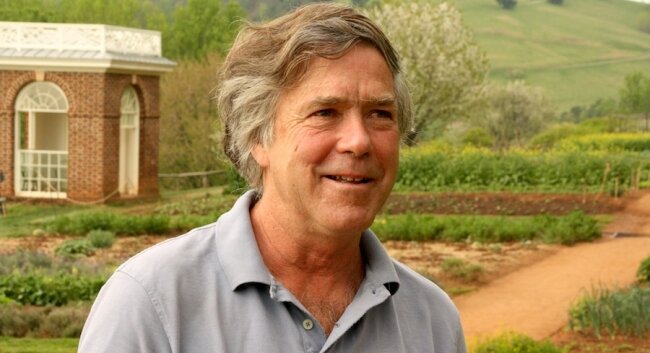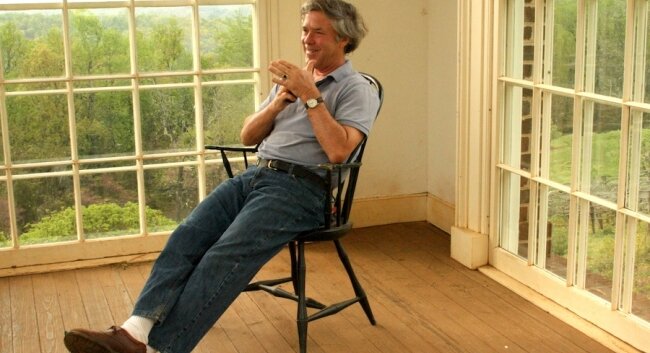American garden: Peter Hatch and the restoration of Jefferson's landscape
-
 In 35 years, Peter Hatch has restored the mountain-top foodscape while transforming the landscape with such features as the Saunders-Monticello Trail.photo by lisa provence
In 35 years, Peter Hatch has restored the mountain-top foodscape while transforming the landscape with such features as the Saunders-Monticello Trail.photo by lisa provence -
 Hatch has great stories about Monticello visitors like Alice Waters, Annie Liebowitz, and Maureen Dowd.photo by lisa provence
Hatch has great stories about Monticello visitors like Alice Waters, Annie Liebowitz, and Maureen Dowd.photo by lisa provence
Peter Hatch is all over the place this month. He's in Washington to help First Lady Michelle Obama plant the White House vegetable garden, he's in San Francisco for a Gardening Conservancy symposium, and look, there he is in this month's Garden & Gun.
Hatch's popularity isn't sudden– for nearly 35 years he's run the gardens and grounds of Monticello. But with his new book and his impending retirement from the World Heritage site upon whose grounds he's put his own stamp, Hatch is even more in demand these days.
Hatch, who soon turns 63, has witnessed not only the origins of the American garden, but also the emergence of Monticello as a leading center for historic research.
"It's been fascinating to see it evolve from a mom-and-pop organization," says Hatch, settling in for yet another interview in the tiny pavilion in the middle of the thousand-foot stretch of terrace that Jefferson constructed and Hatch reconstructed.
For Michigan-born Hatch, who attended the same prep school as Mitt Romney and earned an English degree from the University of North Carolina, that path to the mountaintop was not obvious. After graduation, he assumed he'd be teaching high school English and coaching hockey.
"I was staying with a friend in Massachusetts who was talking about the joys of organic gardening," says Hatch who returned to Chapel Hill, tilled some soil, and studied landscape gardening at a community college. He wryly acknowledges "the curious downward mobility in my education."
That was enough to get him a job as horticulturist at Old Salem, the Moravian village in North Carolina that grew into Winston-Salem, where he was hired to improve the historic landscape.
When Hatch came to Monticello in 1977– before the place became the activist, educational, and preservation epicenter of Jefferson studies that it is today– the famous gardens grew only flowers for the house.
"Monticello was more of a shrine," says Hatch.
"Few topics tell us more about Jefferson as his gardening," observes Hatch, who in his new book A Rich Spot of Earth: Thomas Jefferson's Revolutionary Garden at Monticello calls Jefferson's 330 varieties of 99 species of vegetables and herbs "an Ellis Island" of introduced plants. Particularly revolutionary was Jefferson's refusal to emulate cool-season northern European gardens, embracing instead humid-climate foods like tomatoes, lima beans, and okra.
When Hatch started out at Monticello, his duties ranged from writing books to maintenance of the 2,400 acres including "filling the drink machines." Responsibilities expanded, and today Hatch expresses particular pride over the $7.5 million Thomas Jefferson Parkway with the Saunders-Monticello Trail, used by 120,000 people annually.
"Geared toward the local community, it provides an amenity while protecting the entrance corridor to Monticello," he says.
Other Hatch accomplishments include launching the Historic Landscape Institute, the Center for Historic Plants, and the annual Heritage Harvest Festival. But April is the busiest month with the book launch and with Historic Garden Week, which runs April 21-28.
"Peter Hatch is the best in his business nationwide," says former Monticello head Dan Jordan. "That sounds extreme, but the assessment was endorsed by the award Peter received from the Garden Club of America."
Hatch soon plans to move from a Monticello-owned house at nearby Tufton Farm to his family home in Crozet, where after years of telling people what to do in Jefferson's garden, he'll be working on his own.
His immediate plans on a fine April afternoon involve heading to the mountains in search of a spring ephemeral called Jeffersonia diphylla twinleaf, which was named in honor of the master of Monticello, "a fitting tribute" to Jefferson's interest in natural science, says Hatch. And perhaps it's also a fitting excursion for the man who brought back one of America's most important gardens.
~
Celebrate the book launch with Hatch at an April 23 garden party at 6pm at Monticello. Reservations are required, and tickets are $60.